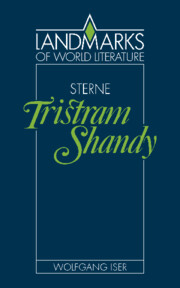IV - Epilogue
Published online by Cambridge University Press: 06 January 2010
Summary
Despite Sterne's enduring fame and place in the history of English literature, no one has yet written a history of the reception of Tristram Shandy. If anyone should undertake it, then it would need to be more than just ‘snake-like squiggles to describe the peaks and valleys of reputation’ (Max Byrd, Tristram Shandy, p. 138). Reception is not orientated solely by prevailing expectations, but also – and sometimes in equal measure – by judgments pronounced in preceding periods which, though more often than not inapplicable, still condition the new question to be asked. Reception always depends upon cultural codes and reactions to past judgments, and from this interplay it is possible to see how the potential of a work has unfolded in the course of its history.
Towards the end of his life, Sterne wrote to an American admirer, thanking him for a walking-stick:
Your walking stick is in no sense more shandaic than in that of its having more handles than one – The parallel breaks only in this, that in using the stick, every one will take the handle which suits his convenience. In Tristram Shandy, the handle is taken which suits their passions, their ignorance or sensibility. There is so little true feeling in the herd of the world, that I wish I could have got an act of parliament, when the books first appear'd, ‘that none but wise men should look into them.’ It is too much to write books and find heads to understand them.
(Sterne, Letters, p. 411)- Type
- Chapter
- Information
- Sterne: Tristram Shandy , pp. 121 - 129Publisher: Cambridge University PressPrint publication year: 1988



